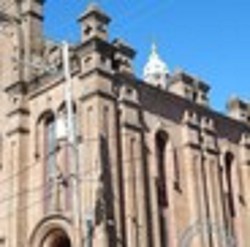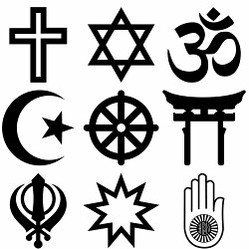One result of the pandemic has been restrictions on people’s movement, ranging from requests to full lockdowns. These restrictions have inhibited people from gathering, including at places of worship. In this area we have restrictions as to how many people can be present in a place, including a place of worship. In our parish about half of the pews are roped off, and the ones in use require empty space between groups.
Many people cannot attend religious services during this pandemic, or they can only attend services on a limited basis. This brings up two possibilities, will they come back or are will they not? If we consider what happened in many countries that restricted religion during Communist times, when the people were allowed access to religion later many had preserved their spiritual faith underground and returned to the churches.
One alarming situation is that few people are bringing young children to religious services, children old enough to be in church, thus interrupting their formative years. Will there be a lingering negative effect on the children years from now whereby they think not attending church is as it should be?
Another problem is that the attendance at services is decreasing as new waves of the virus pass.
After the virus passes, will the pews be fuller or less filled than they were before the pandemic?






 Multivariable Calculus: Gradient, Divergence, and Curlon 12/19/2025
Multivariable Calculus: Gradient, Divergence, and Curlon 12/19/2025
 UAPs, Formerly UFOs, If They Are Real How Can We Explain Their Arrival to Earth?on 12/18/2025
UAPs, Formerly UFOs, If They Are Real How Can We Explain Their Arrival to Earth?on 12/18/2025
 Polar Coordinate Systemon 12/16/2025
Polar Coordinate Systemon 12/16/2025
 Aurora Can Disrupt Electrical Devices And Even the Grid?on 12/15/2025
Aurora Can Disrupt Electrical Devices And Even the Grid?on 12/15/2025



Comments
Thanks for commenting. One thing often impacts another.
Interesting article, blackspanielgallery. It makes one think about the pandemic's impact on people's practice of their faith traditions and what that means for the future..
Certainly He does intend for us to knw much about His plan, but you are correct it that it does exceed our ability to understand. Faith is the requirement He places for such things that are beyond us as humans.
Perhaps the best analogy is that faced by a parent who must deny a child something even though the perception by the child does not include the depth of understanding of the overall consequences. Worse, is when one must deny one child because another will suffer consequences. God works with the whole, all of creation, of which we can see but a small part and have limited understanding.
I think that God does not forbid us to know his plan, but that its intricacy is too much for us to understand. Would some knowledge be more than we can bear.
The church on the left is Saint Mary's Assumption Catholic Church in New Orleans, which is also the place of burial and associated with the Shrine to Blessed Francis Xavier Selos, a priest who died during the Yellow Fever epidemic administrating to the workers who had become ill. He was a German born Redemptorist priest and died rather young in his ministry. I believe the shrine is now next door in a former convent. It was my parish when I was very young, and the Redemptorist order was still running it, and probably still do so. The inside is even more impressive.
Unfortunately, people seem to want to understand god's plan more than is allowed, and make disturbing conclusions when suffering happens to them.
blackspanielgallery, Thank you for the practical information, pretty picture and product line (I read the daily inspirations and the map to the future is more often away from its place on the shelf than on it).
It's disappointing, sad and unhelpful when God is blamed for something that people could have averted or minimized or terminated.
What is the church in the image to the left of your title?
Here there was an effort locally to stop gatherings, then it went to 25% capacity, then 50%, now we are going back down. They included churches, and other places of worship, for all services. This comes from local and state levels, not the federal government. On Christmas we had extra Masses, and even two Masses concurrently, one in the church and one in the gym. With more than half the space empty the congregation would never have fit.
I realize prayer does not require a building, but it is nice to be able to attend.
Our archbishop gave a dispensation from Sunday Mass attendance since the allowed amount of people was so low. I do not know if that is nationally or locally. The bishops in the U. S. work together often.
I observed on one Sunday only one or two families had children between Communion and Confirmation ages.
In the UK I have heard nothing negative being said about religion during the pandemic, though some politicians have shut churches when they have had the power [Scotland, where the churches are taking the devolved government to court about it.] People appreciate places of worship that open as vaccination centres and food banks. People are faced with problems, some turn to God, some don't. Time will tell. God is active despite the virus; Christ is alive; the Holy Spirit is working as normal.
Who is to say that people don't pray at home?